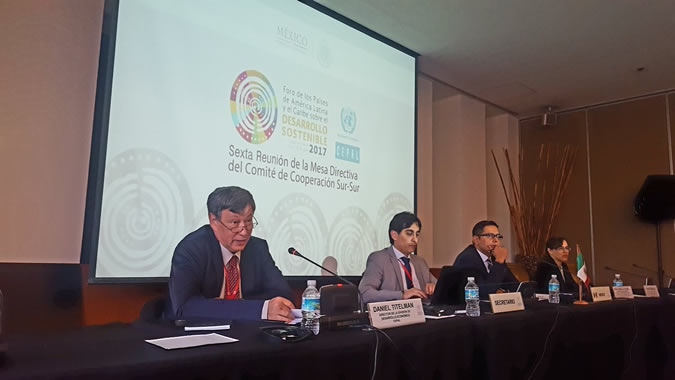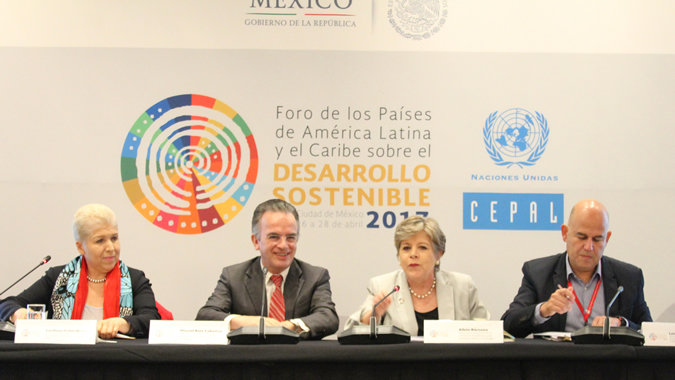ECLAC Calls for Strengthened South-South Cooperation to Attain the Sustainable Development Goals
Work area(s)
In response to protectionist movements in the world, multilateralism will allow the countries of Latin America and the Caribbean to achieve development with equality and sustainability, says the organization.

Only by combining initiatives and efforts will the countries of Latin America and the Caribbean be able to attain the Sustainable Development Goals (SDGs), since what is needed is global governance and new partnerships between States, their citizens and the private sector. In responding to that imperative, South-South cooperation can and must make a significant contribution, says the Economic Commission for Latin America and the Caribbean (ECLAC).
Daniel Titelman, the Director of the Economic Development Division of ECLAC, representing the Executive Secretary of the United Nations Regional Commission, Alicia Bárcena, opened the Sixth Meeting of the Presiding Officers of the Committee on South-South Cooperation this Tuesday, 25 April 2017. He said that multilateral cooperation bolsters the possibility of the region’s countries meeting the 2030 Agenda and its 17 SDGs.
South-South cooperation, he added, has grown in importance and currently accounts for 15.2% of all official development assistance (around 20 billion dollars a year), according to figures from the United Nations.
As examples of the importance of South-South cooperation in the region, he cited the work undertaken by ECLAC and a number of Mexican institutions in Haiti. In response to a request made by the Haitian Institute of Statistics and Informatics, over the past five years and in conjunction with Mexico’s National Statistics and Geography Institute (INEGI), ECLAC has been providing advisory services and assistance for the design of an indicator of current economic activity, a tool that Haiti previously did not have.
Another project was a study by ECLAC and the Mora Institute into the lessons learned through the South-South cooperation of Brazil, Chile and Mexico with Haiti. A third effort is the work that ECLAC and the Colegio de México have been carrying out since 2007, promoted by Canada’s International Development Research Centre (IDRC), as part of a project for Latin America to reflect about new ways to cooperate with Haiti.
“These examples reinforce the idea that within the region we must make efforts to connect South-South cooperation with a broad and multifaceted concept of development: one that aims to improve standards of living, but also to bring about processes of sustainable and inclusive growth that address the social and productive inequality that characterizes the countries of Latin America and the Caribbean,” said the United Nations official.
Yanerit Morgan, the Director-General for Americas Region Organizations and Mechanisms at Mexico’s Secretariat of Foreign Affairs, noted in turn that South-South cooperation offers a splendid opportunity for regional integration in such areas as infrastructure, tourism and fighting inequality.
Authorities and officials responsible for cooperation undertakings in the region began their work under the chairmanship of Noel González, the Coordinator for Multilateral and Regional International Development Cooperation Forums and Mechanisms of the Mexican International Development Cooperation Agency (AMEXCID).
The meeting is being held in Mexico City, on the occasion of the Forum of the Countries of Latin America and the Caribbean on Sustainable Development, an event jointly organized by ECLAC and the Government of Mexico that is taking place from 26 to 28 April.
Related content

More Than 150 Civil Society Organizations Meet in Mexico Before the Regional Forum on Sustainable Development Begins
ECLAC’s Executive Secretary, Alicia Bárcena, and Mexico’s Undersecretary for Multilateral Affairs and Human Rights, Miguel Ruiz-Cabañas, inaugurated the gathering at a hotel in the capital.
Related event
Subregional headquarter(s) and office(s)
Type
Country(ies)
- Latin America and the Caribbean
-
Mexico
Contact
Public Information Unit
- prensa@cepal.org
- (56 2) 2210 2040